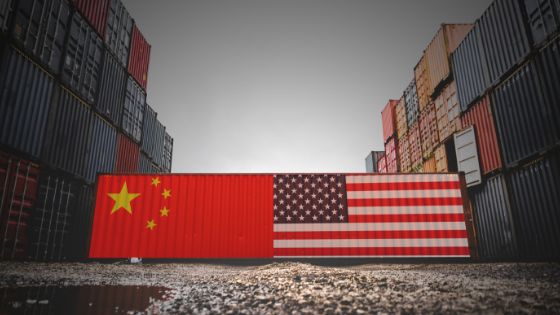Editors note: Tariffs are not taxes on consumers. The supply chain is being disrupted away from China.
Trump’s threat to impose tariffs on more consumer goods leaves industry anxious
[Alistair Gray | August 9, 2019 | Financial Times]
President Donald Trump’s plan to impose a new round of trade tariffs on Chinese imports is complicating US retailers’ relationships with suppliers as both sides prepare to haggle over prices in an attempt to protect profit margins.
While corporate America has put the threat of higher consumer prices at the forefront of its lobbying campaign against the duties, it is far from clear that the higher costs will flow straight to the checkout. Throughout the supply chain, companies are trying to maximise their negotiating clout to reduce the damage to their own bottom lines.
Jan Rogers Kniffen, a retail industry consultant, said it was already “internecine warfare” between retailers and suppliers. “It becomes more intense as costs start to increase.”
US business has already been dealing with three earlier waves of China tariffs, yet the planned fourth round — 10 per cent duties on $300bn of annual imports, starting next month — poses a bigger challenge to retail because it targets a broader range of consumer products.
Limiting the threat of higher consumer prices is the power of the biggest retailers such as Walmart, long adept at squeezing the best possible deal from suppliers. “It’s much easier for someone like Walmart to say ‘this is the price we will accept or we’ll walk away’,” said Jeff Lenard, vice-president of strategic industry initiatives at the National Association of Convenience Stores.
The rise of retailers’ own brands, known as private-label goods, had given the likes of Costco and Walmart even more control in negotiations, said Ken Harris, managing partner at Cadent Consulting Group. “They’ve been pushing back for a long time [against price rises],” he said.
The rise of internet shopping, however, has undermined retailers’ pricing power. Consumers can more easily compare products online. Deep discounters Aldi and Lidl have made the retail business even more competitive in some categories.
Mr Kniffen said he doubted that the retail sector would be able to push up prices in response to the latest tariffs. He noted that the products targeted, from trainers to electronics, were largely discretionary, and consumers could postpone their purchase.
“Other than extremely strong brands, the consumer will not be accepting price increases,” he said. “I expect virtually all of the cost to be absorbed by either the retailer, or in the supply chain.”
Suppliers are on edge over how companies such as Walmart, which is due to report earnings next week, will respond.
“The answers aren’t there yet. We’ve never been down this path before,” said Win Cramer, chief executive of Jlab Audio, a California-based maker of earbuds and headphones. He noted that tariffs could yet be reversed “with a tweet” from the president. “We’re kind of in wait-and-see mode from a price perspective and what the retailers are going to do.”
Speaking from the airport in Minneapolis, where he had been meeting two of the country’s biggest retailers, he said: “Instead of discussing holiday plans, we’ve been discussing tariffs.”
Jay Foreman, founder of Florida-based toymaker Basic Fun, said that uncertainty from Washington over how toys would be treated had made retailers “reluctant to start the conversation” about how to manage the impact.
“We’re starting the conversations now,” he said. Some retailers told him they were “going to immediately pass along the tariffs and increase prices by 10 to 20 per cent this Christmas”. Others were calling on his company to “split the cost”, and were holding off on price rises for now.

Tepid headline inflation figures suggest that tariffs have had limited impact on consumer prices so far, although industry data show that Americans are paying more for a range of everyday items from soap to toilet rolls.
Household product inflation has accelerated over the past year: prices for non-edible consumer goods rose 3 per cent in the year to the end of June, according to figures from Nielsen, more than double the rate of the previous year.
Moreover, noted David French, senior vice-president of government relations at the National Retail Federation, tariffs enacted so far had not hit popular consumer products directly. “What has happened to date is not a good indication [of future price rises],” he said.
A report commissioned by the NRF earlier this year warned that US consumers would pay $4.4bn more each year for clothing, $2.5bn more for footwear and $3.7bn more for toys if the administration enacted 25 per cent tariffs on the $300bn of goods, as it had threatened.
“The heat [on consumer prices] is being gradually turned up,” Mr French said, adding that after the new round of tariffs kicks in “we may see significant changes in the temperature”.
However much of the pain is ultimately passed on to consumers, it is hard to see how tariffs will do anything other than hurt companies reliant on Chinese supply lines.
That is reflected in the share prices of retailers, including Best Buy, Abercrombie & Fitch and Macy’s, which have sold off heavily since Mr Trump announced the latest round of tariffs last week.
Wade Miquelon, chief executive of Jo-Ann Stores, an Ohio-based fabric and crafts chain with about 870 stores and 23,000 employees, said that even if retailers did push up prices in response they risked hurting revenues through lower volumes.
“There is no free lunch,” he said. “Raising prices means less demand.”
Mr Miquelon said he doubted that anyone in the retail industry wanted to raise prices. “But on the other hand, if you don’t when these tariffs come in, you’re dead in the water.”
Read the original article here.













